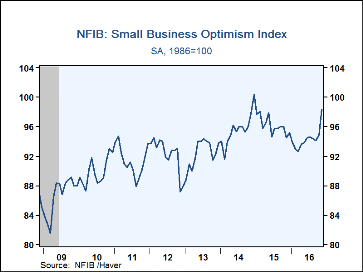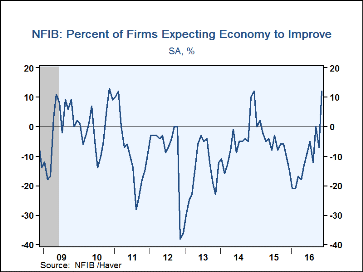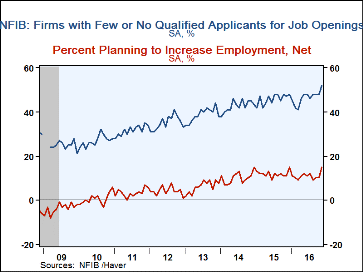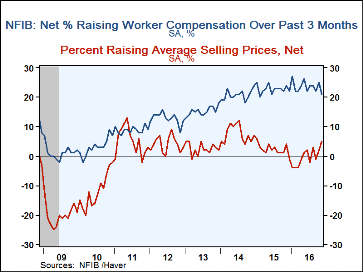 Global| Dec 13 2016
Global| Dec 13 2016U.S. Small Business Optimism Nears Two-Year High
by:Tom Moeller
|in:Economy in Brief
Summary
The National Federation of Independent Business reported that its Small Business Optimism Index jumped 3.7% during November (4.1% y/y) to 98.4. It was the strongest level of optimism since December 2014. A strengthened 12% of firms [...]
The National Federation of Independent Business reported that its Small Business Optimism Index jumped 3.7% during November (4.1% y/y) to 98.4. It was the strongest level of optimism since December 2014.
A strengthened 12% of firms reported they were expecting the economy to improve, also the most since December 2014. Another area of strength was that 11 percent expected higher real sales in six months, up from one percent in October. Fifteen percent of firms expected to increase employment, the most since December of this year.
Also on the labor front, a sharply increased 52% of firms indicated they had few or no qualified candidates to fill job openings. That was the most since October 1999. Thirty one of firms indicated they had positions they were unable to fill right now, up from 9% during all of 2009. Despite hiring difficulty, a lessened 21% percent of firms were raising worker compensation. That's down from 25% in October, and below January's 27% high. A lessened 15% were planning to raise worker compensation, below December's 21% high.
An the price inflation front, an increased 5% of firms were raising average selling prices, the most since January of last year. Expectations for pricing also remained strong as 19% planned to raise prices, the most since December.
A sharply lower nineteen percent of firms indicated that taxes were the single most important problem, and a lower 18% reported that government requirements were the largest single problem. A slightly increased 16% felt challenged by the quality of labor, while just 12% of firms indicated that poor sales were the largest single problem. Ten percent of firms reported insurance cost & availability as the largest hurdle, up sharply from a 7% September low. Just 6% reported the cost of labor was the biggest problem, and a lessened 7 percent reported competition from large businesses as the largest problem. Inflation as the largest problem was indicated by a higher 3% percent of respondents, the most in 6 months.
Roughly 24 million small businesses exist in the U.S. and they create 80% of all new jobs. The typical NFIB member employs 10 people and reports gross sales of about $500,000 a year. The NFIB figures can be found in Haver's SURVEYS database.
| National Federation of Independent Business (SA, Net %) | Nov | Oct | Sep | Nov'15 | 2015 | 2014 | 2013 |
|---|---|---|---|---|---|---|---|
| Small Business Optimism Index (1986=100) | 98.4 | 94.9 | 94.1 | 94.5 | 96.1 | 95.6 | 92.4 |
| Firms Reporting Now is a Good Time To Expand the Business | 11 | 9 | 7 | 12 | 11 | 10 | 7 |
| Firms Expecting Higher Real Sales In Six Months | 11 | 1 | 4 | -1 | 8 | 11 | 4 |
| Firms Expecting Economy To Improve | 12 | -7 | 0 | -10 | -5 | -5 | -15 |
| Firms Planning to Increase Employment | 15 | 10 | 10 | 11 | 12 | 10 | 6 |
| Firms With Few or No Qualified Applicants For Job Openings | 52 | 48 | 48 | 47 | 46 | 43 | 39 |
| Firms Reporting That Credit Was Harder To Get | 4 | 4 | 5 | 4 | 4 | 6 | 6 |
| Firms Raising Average Selling Prices | 5 | 2 | -1 | 4 | 2 | 8 | 2 |
| Firms Raising Worker Compensation | 21 | 25 | 22 | 24 | 23 | 21 | 15 |
Tom Moeller
AuthorMore in Author Profile »Prior to joining Haver Analytics in 2000, Mr. Moeller worked as the Economist at Chancellor Capital Management from 1985 to 1999. There, he developed comprehensive economic forecasts and interpreted economic data for equity and fixed income portfolio managers. Also at Chancellor, Mr. Moeller worked as an equity analyst and was responsible for researching and rating companies in the economically sensitive automobile and housing industries for investment in Chancellor’s equity portfolio. Prior to joining Chancellor, Mr. Moeller was an Economist at Citibank from 1979 to 1984. He also analyzed pricing behavior in the metals industry for the Council on Wage and Price Stability in Washington, D.C. In 1999, Mr. Moeller received the award for most accurate forecast from the Forecasters' Club of New York. From 1990 to 1992 he was President of the New York Association for Business Economists. Mr. Moeller earned an M.B.A. in Finance from Fordham University, where he graduated in 1987. He holds a Bachelor of Arts in Economics from George Washington University.
More Economy in Brief
 Global| Feb 05 2026
Global| Feb 05 2026Charts of the Week: Balanced Policy, Resilient Data and AI Narratives
by:Andrew Cates










